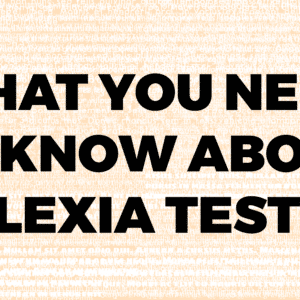
Dyslexia can cause problems with reading, writing and spelling. Here is what you need to know about Dyslexia testing. It is a common learning difficulty but unlike learning disability, it doesn’t affect intelligence. This learning difficulty causes problems with learning as it can affect a persons ability to read and write.
As with everything, early intervention is important but it can be tricky to spot dyslexia in young children as the signs and symptoms aren’t always obvious.
There are also other conditions that can affect a persons ability to read and write. So it is important to seek advice from your GP if you have concerns about your child. If other conditions have been ruled out and you are concerned about your child’s progress. You should speak to their class teacher and Senco. They may be able to put additional support in place.
But is there a test?
Being assessed for Dyslexia is not an easy or straightforward process. An Educational Psychologist or a Specialist Dyslexia Teacher can help. They will be able to offer support to you and your child’s teacher. They also give suggestions and interventions that may be helpful.
If these suggestions and interventions don’t help you can request that your child be referred for a Dyslexia Assessment by your Educational Psychologist.
Alternatively, you can have your child assessed by other organisations. You can contact Local and National Dyslexia Associations for assessment information or you can find an Independent Educational Psychologist. They will be able to do the assessment privately.
The first step of testing for Dyslexia will be that yourself and your child’s school will be asked to fill out a questionnaire about your child. This will help to build up a picture of your child’s difficulties. Your child will also need to be observed within their learning environment.
They will want to assess your child’s ability to read and write as this is one of the main areas where Dyslexia can cause problems. However, they will also want to look at language and vocabulary development, processing speeds (both visual and audio), organisational skills, logical reasoning and memory.
Once your child has been assessed you will receive a detailed report including their strengths and weaknesses. This report will also include suggestions on how to help improve any difficulties that have been spotted.
Your child may also need a SEN support plan put in place to help at school. Extra time during exams, coloured overlays or lenses and access to a laptop are common reasonable adjustments for pupils in school. It is important to get the best support to improve reading and writing skills to enable success at both school and later on in work.
It is estimated that 1 in 10 people in the UK has some degree of dyslexia. Your child may need extra educational support if they are diagnosed with dyslexia. With the correct support, there is no reason that your child can’t attend a mainstream school. However, some children may benefit from a more specialist setting.
We hope that this has given you what you need to know about dyslexia testing. If you or your child have been diagnosed with Dyslexia you might be wondering, what are some good strategies for dealing with it?
We have curated “5 ESSENTIAL Strategies To Help Dyslexic People” it’s super handy so if you fancy reading it click the link below:
https://blog.chewigem.com/5-essential-strategies-to-help-dyslexic-people/
To Read The Whole Collection, Click Below:
https://blog.chewigem.com/decoding-dyslexia-everything-you-need-to-know-about-dyslexia/
If you want any more support, somewhere to vent or just want to meet some like-minded people in a supportive environment, why not consider joining our Facebook Sensory Support Group!
Sensory Matters Podcast
Free Sensory Support Community
Can Chewigems Help Keep Your Teeth Clean?